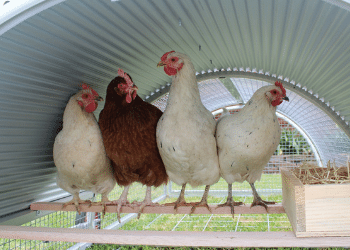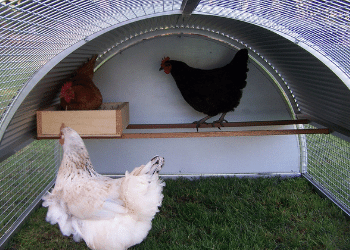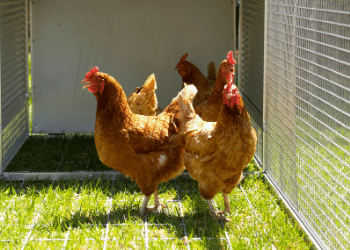Chicken Behaviour
-
Who Rules the Roost in your Chicken Coop?
If you've ever found the time to sit and observe the interactions of backyard chickens, you'll no doubt understand where the term 'pecking order' originated. While you might debate who 'rules the roost' in your home or workplace, you can be sure that there is a clear 'King' or 'Queen' that dominates your backyard chicken coop.
The concept of a 'pecking order' was coined back in the 1920s by biologists who discovered that backyard chickens maintain a hierarchy with one chicken pecking another of lower status. In the absence of a rooster, one particular chicken will dominate all others. The 'pecking order' concept was transferred to human behavior in the 1950s.
Chicken domination
While owners of backyard chickens may not be aware of such a hierarchy, the chickens most definitely know their place in the coop society. If you have chickens in your backyard, take a moment to simply look at the condition of their feathers. There will be one chicken that will stand out with its beautiful crop of feathers entirely intact. If you take a little more time to sit and watch the action in your chicken coop, you'll see that this 'top chook' has been given the right to peck any other chicken in the flock, with no retaliation. While you may not be able to make out the order entirely, there is a definite hierarchy. Each chicken knows whom they are allowed to dominate and whom they need to step aside for in terms of eating first and having the privilege of the best laying boxes and perches. The favourite laying boxes and perches are generally those that are the highest in the chicken coop, and therefore the greatest distance away from predators.Chicken coop introductions
If you've just taken the step to acquire backyard chickens or are about to do so, be prepared for a short period of intense fighting between your new pets. This fighting determines whether a chicken is dominant or submissive and therefore where they sit in the pecking order. Interestingly, if you remove a chicken from a well-established flock for only a day and then put that bird back in the chicken coop again, fighting amongst the entire flock will reoccur to re-establish the appropriate pecking order. This is also found to occur when a chicken is injured, with their place in the pecking order significantly down-graded as a result.Adding New Chickens
Of course when you add new chickens to an existing flock of chickens the pecking order needs to be re-established. While it's unlikely that you will be able to prevent fighting -
5 Tips for Adding New Chickens to your Backyard Flock
If you’re thinking of adding a few new spring chickens to your backyard flock to boost the egg count, here are 5 tips to make the transition process as easy as possible for you, your older hens and the new additions.
Most people are familiar with the concept of a 'pecking order' in chicken society. Many people however, do not realise the implications of adding new chickens to an existing flock, which has previously established each member's place within the chicken hierarchy.

You might not realise it, but chickens know whom they are allowed to pick on (those beneath them in the hierarchy) and which other chickens they must be submissive to. Adding new chickens throws the hierarchy into confusion, with a new order needing to be established. During this phase, fighting will occur amongst the chickens in order to determine who is submissive and who is dominant, and in the end, which bird will be the 'top chook'.
1. Use two coops side by side
If you happen to have two chicken coops (or chicken tractors) or are able to borrow a small coop for a week or two, you have the option of putting your new chickens in this second coop, which can then stand alongside your main coop. This gives both groups of chickens the opportunity to get familiar with each other, without any physical contact. After a week or so, you can then integrate the new chickens into the main coop. While it's likely that there'll be some fighting, it will be less intense due to the precautionary, 'familiarization' stage that you've undertaken.
2. Introduce new chickens at night-time
It has also been found that introducing new chickens to a flock at night-time can help to minimize the fighting that occurs. Grab a torch and place the newest additions amongst the older chickens on the perches. At night-time t
-
How to Keep Chickens Cool in Summer | Chicken Coop Tips
While chickens are fairly robust animals, summer can be fatal for your feathered flock. It’s important that all backyard chicken owners are able to identify when their chickens are in distress and what to do about it. As chickens are unable to sweat, they use other ways to try to reduce their body temperature in summer.

Chickens will pant when they are hot to try to remove moisture from their bodies by evaporation. They also hold their wings out slightly to get cool air closer to their bodies. If you visit your chicken coop and find your chickens looking lethargic and their combs are faded and dry, it may already be too late as they are likely experiencing heat stress. The best thing is to be proactive b


